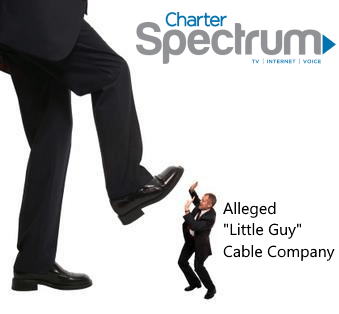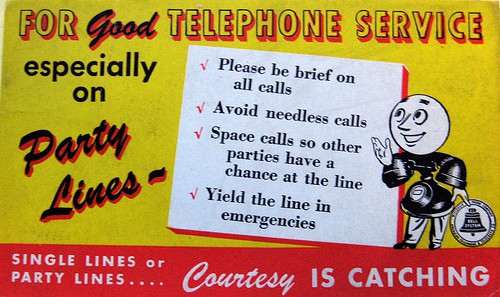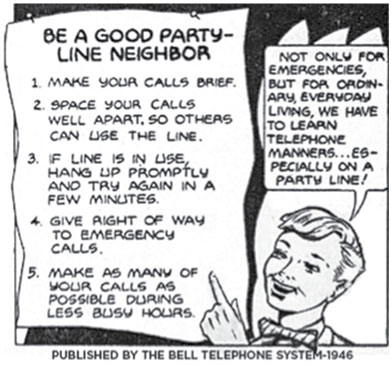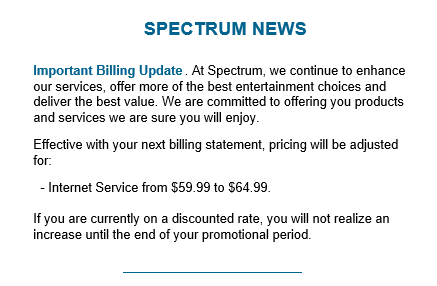 The last remaining parts of the country formerly served by Time Warner Cable are rebranding as Charter/Spectrum today, with the introduction of new service plans in upstate New York, western Massachusetts, Maine, and parts of the Carolinas.
The last remaining parts of the country formerly served by Time Warner Cable are rebranding as Charter/Spectrum today, with the introduction of new service plans in upstate New York, western Massachusetts, Maine, and parts of the Carolinas.
“Redefining what a cable company can be,” as Charter Communications promotes to its customers, is a tall order for a cable company that is often loathed by its customers. Our readers have reached out to us all day to suggest, at least so far, Spectrum is the same old cable company, just with a new name.
“If I switch away from my Time Warner Cable plan to adopt a Spectrum plan, my bill will increase $40 a month,” complained Rochester, N.Y. resident June Patterson. “Even the customer service person I talked to said it would be crazy for me to switch plans.”
A customer in Albany, N.Y., reported their bill would increase by $30 a month. Another in Silver Creek, N.Y., claimed a $40 rate rise by switching to a Charter/Spectrum plan.
“I pay $92.06 now for Starter TV and Ultimate Internet in the Ithaca area,” shared another customer on DSL Reports. “After going through two operators, the second one is telling me my price will go up to $125.”
That’s a rate increase of $32.94 a month — $395.28 more a year.
Customers are encountering new plans for television service, but many areas only receive one advertised broadband speed option: 60Mbps. In fact, most areas can also buy 100Mbps service, but it’s very expensive at around $100 a month with a $200 setup fee. Customers have to call to change plans to get either speed. Some customers in former Time Warner Cable Maxx areas have better luck getting the setup fee waived than those living in areas Time Warner Cable never had a chance to upgrade.
In Idaho, The Spokesman Review’s D.F. Oliveria reports Charter/Spectrum is even worse than what Time Warner Cable offered before:
Our new internet service provider, Spectrum (Charter Communications), the company that “merged” with Time Warner’s local cable, has come under increasing fire lately. Many consumers have been calling me about poor customer service, very slow and/or inconsistent internet speeds, higher monthly prices and no printed material available to consumers regarding offerings.
“Since the merger, my bill went up $20 a month and speeds have slowed significantly,” shared ‘Nic’ in northern Idaho. “It’s ridiculous.”
WFTS in Tampa reports former Bright House customers can expect steep rate increases from Charter/Spectrum. (3:21)
In former Bright House territory in Florida, customers saw bills skyrocket by as much as $182 a month, resulting in monthly charges of an unprecedented $305 a month. Charter Communications refused to deal with the affected customers until WFTS-TV’s “Action News” consumer reporter Jackie Callaway intervened and finally got the company to admit the bills were too high by mistake:
Bright House customers Ivan and Linda Sordo say the rate hike hit without warning. The Sordo’s typical bill of $141 shot up to $305 overnight and without warning. And Lillian Rehrig’s normally $123 bill more than doubled to $305. Rehrig says calls to Spectrum got her a partial reduction but no real relief. Her next Spectrum statement came in $120 higher than her old Bright House bill.
What happened in these two cases turned out to be a billing error, an error Spectrum’s owner Charter Communications corrected after we started asking questions.
“When you started speaking with them is only when I got anyone to respond.”
 It isn’t known how many other Tampa area customers were also overbilled or if Charter was working to identify and refund those who did not pursue a complaint with a local television newscast.
It isn’t known how many other Tampa area customers were also overbilled or if Charter was working to identify and refund those who did not pursue a complaint with a local television newscast.
Charter Communications did tell WFTS-TV the majority of the one million former Bright House customers in the area now being served by Charter/Spectrum will face rate increases of $20-30 a month on average as their current package with Bright House expires. Those customers switching from a grandfathered Bright House or Time Warner Cable package will also automatically lose any promotion those packages were receiving.
In North Carolina, Time Warner Cable is gone and apparently so are some customers’ $300 rebate cards. Time Warner Cable had a long history of customer complaints about its rebate programs, but Charter Communications isn’t too interested in helping customers meet the terms of those rebates and intervene when something goes wrong.
A Steele Creek couple told WSOC-TV Time Warner rejected their rebate after they configured autopay on their Spectrum account with the help of a Charter customer service agent. Despite repeated assurances from customer service, the transition to autopay did not take effect quickly enough and they missed a payment, which canceled their rebate eligibility. Countless hours of negotiations with Charter’s customer service representatives got the couple nowhere. But the promise of bad publicity on the local evening news made the difference, and a $300 gift card was promptly mailed to them. Many other customers simply give up.
WSOC in Charlotte covers the case of the missing Time Warner Cable gift card. Customer service was no help. (1:54)
In Southern California, Spectrum is busy raising rates as well. Hannah Kuhn (76) of Simi Valley saw her bill jump $46 a month after Spectrum took over from Time Warner Cable last fall. Nobody would offer an explanation and in return for her complaints, they evidently shut the grandmother’s cable service off. Most Time Warner Cable customers are enrolled in some type of bundled service promotion. As those promotions expire, Spectrum raises rates to the regular price it intends to charge customers going forward, ending Time Warner Cable’s practice of lowering rates when customers complain.
Most customers with a popular bundled service package rate combining broadband, phone, and television could see their rates rise between $250-360 a year.
Former Time Warner Cable customers across the northeast and mid-Atlantic woke up this morning to incessant advertising like this promoting a “new day” for cable service, courtesy of Charter/Spectrum. (:60)


 Subscribe
Subscribe Charter Communications/Spectrum customers (including former Bright House and Time Warner Cable customers) need to take a moment to protect their right to collect damages from future class action cases likely to be filed over the company’s alleged failure to deliver advertised broadband speeds and in the case of Time Warner Cable, the alleged provision of obsolete cable modems for which the cable operator charged customers $10/month.
Charter Communications/Spectrum customers (including former Bright House and Time Warner Cable customers) need to take a moment to protect their right to collect damages from future class action cases likely to be filed over the company’s alleged failure to deliver advertised broadband speeds and in the case of Time Warner Cable, the alleged provision of obsolete cable modems for which the cable operator charged customers $10/month.
 The FCC order approving the merger deal was hardly onerous, requiring Charter to compete head-to-head for customers in places the company can choose itself. Lawmakers eliminated exclusive cable franchise agreements years ago, but established major cable operators like Charter have gone out of their way to avoid competing in areas that already receive cable service. While Wheeler may have hoped some of that competition would be directed against fellow cable companies, Charter CEO Thomas Rutledge quickly made clear to investors and the FCC Charter would continue to avoid direct cable competition, instead promising to expand service into non-cable areas that already get DSL service from the phone company or no broadband at all.
The FCC order approving the merger deal was hardly onerous, requiring Charter to compete head-to-head for customers in places the company can choose itself. Lawmakers eliminated exclusive cable franchise agreements years ago, but established major cable operators like Charter have gone out of their way to avoid competing in areas that already receive cable service. While Wheeler may have hoped some of that competition would be directed against fellow cable companies, Charter CEO Thomas Rutledge quickly made clear to investors and the FCC Charter would continue to avoid direct cable competition, instead promising to expand service into non-cable areas that already get DSL service from the phone company or no broadband at all. Rutledge’s clear views about Charter’s expansion plans apparently never made it to the American Cable Association, a cable industry lobbying group that defends the interests of independent and smaller cable operators. Despite Rutledge’s public statements, the ACA and its members are afraid Charter could expand on their turf anyway, potentially forcing small cable operators to compete with the same level of service Charter offers. The horror.
Rutledge’s clear views about Charter’s expansion plans apparently never made it to the American Cable Association, a cable industry lobbying group that defends the interests of independent and smaller cable operators. Despite Rutledge’s public statements, the ACA and its members are afraid Charter could expand on their turf anyway, potentially forcing small cable operators to compete with the same level of service Charter offers. The horror. The real goal here is to minimize direct competition at all costs. The FCC’s deal conditions already included the need for more rural broadband expansion. Wheeler’s second goal was to introduce a new model — cable company competing against cable company — fighting for new customers by offering consumers better service and pricing. The existence of such competition would belie the industry’s claim that cable overbuilds and head-to-head competition is uneconomical. Wildly profitable, perhaps not, but certainly possible. Historically, the traditional way cable operators dealt with the few instances of direct cable competition was to buy them out to put them out of business. Rutledge was certainly thinking along those lines when he complained that the FCC’s order to compete did not include permission to eventually devour its competitor, effectively making competition go away.
The real goal here is to minimize direct competition at all costs. The FCC’s deal conditions already included the need for more rural broadband expansion. Wheeler’s second goal was to introduce a new model — cable company competing against cable company — fighting for new customers by offering consumers better service and pricing. The existence of such competition would belie the industry’s claim that cable overbuilds and head-to-head competition is uneconomical. Wildly profitable, perhaps not, but certainly possible. Historically, the traditional way cable operators dealt with the few instances of direct cable competition was to buy them out to put them out of business. Rutledge was certainly thinking along those lines when he complained that the FCC’s order to compete did not include permission to eventually devour its competitor, effectively making competition go away.
 The average Charter/Spectrum customer shares their internet connection with up to 499 of their neighbors, according to an admission made today by Charter Communications CEO Thomas Rutledge.
The average Charter/Spectrum customer shares their internet connection with up to 499 of their neighbors, according to an admission made today by Charter Communications CEO Thomas Rutledge. Rutledge’s comments this morning suggest Charter/Spectrum customers may be sharing their connection with up to 499 of their neighbors, making them more likely to experience congestion potentially worse than experienced with Time Warner Cable. Standard internet service from Charter is also much faster than Time Warner Cable’s corresponding Standard plan — 60Mbps vs. 15Mbps, which has the potential to lead to even worse slowdowns if customers use their internet connections at the same time.
Rutledge’s comments this morning suggest Charter/Spectrum customers may be sharing their connection with up to 499 of their neighbors, making them more likely to experience congestion potentially worse than experienced with Time Warner Cable. Standard internet service from Charter is also much faster than Time Warner Cable’s corresponding Standard plan — 60Mbps vs. 15Mbps, which has the potential to lead to even worse slowdowns if customers use their internet connections at the same time.
